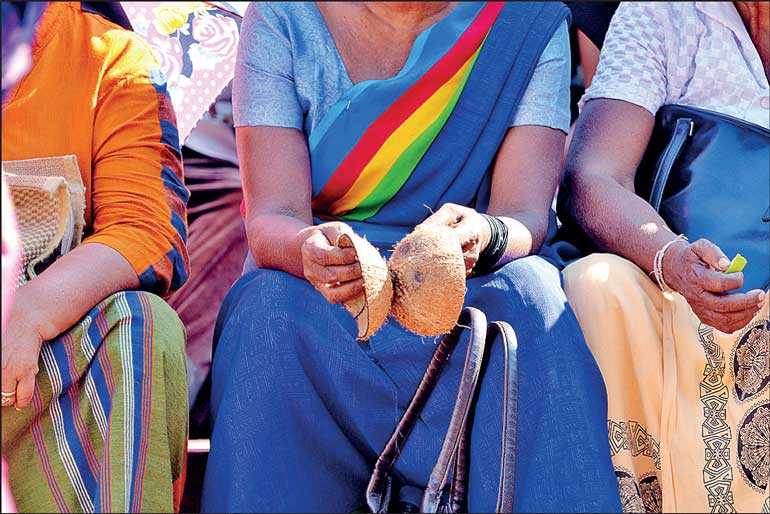Saturday Feb 14, 2026
Saturday Feb 14, 2026
Friday, 27 November 2020 00:00 - - {{hitsCtrl.values.hits}}

WCIC welcomes the initiative to encourage entrepreneurship in 25,000 women chosen from Samurdhi families as an initiative that will contribute to them moving from being ‘dependent on the State’ to ‘contributors to the economy’ – Pic by Shehan Gunasekara
The Women’s Chamber of Industry and Commerce (WCIC) congratulates the Government on the 2020/2021 development and growth oriented Budget.
WCIC Chairperson Indrani Fernando stated: “The Women’s Chamber would like to congratulate the Government for presenting a Budget which has focused significantly on improving the local businesses, education and skill development and promoting environmentally-friendly business practices. WCIC also  submitted several proposals to the Government for consideration for the Budget and we are happy to note that some of our suggestions too have been considered by the Government.”
submitted several proposals to the Government for consideration for the Budget and we are happy to note that some of our suggestions too have been considered by the Government.”
WCIC submitted proposals in the following areas:
Our views on some of the initiatives proposed by the Budget 2020/21 are given below.
Encouraging the spirit of entrepreneurship
We applaud the Government on its proposals to encourage entrepreneurship including the focus on women under the Samurdhi scheme and young men and women who have completed vocational training. This appears a well thought of scheme which includes setting up a process and preferential financing schemes.
We see the initiative to encourage entrepreneurship in 25,000 women chosen from Samurdhi families as an initiative that will contribute to them moving from being ‘dependent on the State’ to ‘contributors to the economy’. We are also encouraged to note that these network of shops will function under Government sponsorship with a Rs. 1,000 million as Government contribution to provide credit facilities and that priority will be given to sell local products. We hope this initiative will benefit many courageous females who have micro-cottage industries to grow and scale their businesses.
One of the focus area of WCIC is to build capacity of women in the micro sector to grow and scale and be able to obtain financing as required for this progression. Therefore, WCIC looks forward to contribute by assisting the micro women entrepreneurs to make use of this timely opportunity.
We would also like to commend the proposal to encourage individuals who have completed vocational education to become entrepreneurs. We believe that this will be an initiative that will assist the country to develop high-skilled entrepreneurs who can build successful businesses.
We are also encouraged by the initiatives to support villages engaged in traditional industries to expand their production and to facilitate access to markets. There is definitely an abundance of high skilled traditional crafts that we should preserve and promote and brand as Sri Lankan products thereby also increasing the Sri Lankan brand.
We also believe that the proposal to allocate Rs. 1,500 m to purchase raw material for Thriposha will also encourage the SME sector to increase its focus on agriculture while also ensuring we provide the much required Thriposha to pregnant mothers and infants.
The measures to promote Small and Medium Scale exports (TIEP Scheme) backed by a contributor insurance scheme to assist in working capital requirements to export high quality goods through high value addition to local inputs will also certainly assist the SME Exporters.
Providing a conducive environment to encourage local manufacturing, and prevent unfair competition
We congratulate the Government on its proposal to encourage local businesses, especially in the agriculture, dairy and pharmaceutical manufacturing sectors via the proposed concessions and tax relief. We believe it is a step in the right direction to focus on improving the agriculture sector by limiting importation of agricultural commodities except the items that cannot be produced domestically and imposing the special commodity levy to balance the supply and demand of domestic production for selected agricultural products. While we do not encourage import bans on a long-term basis, we also believe it is important to provide a conducive environment to encourage selected local industries to grow and scale.
Industries such as local footwear manufacturing industry has to import most material from outside which make their products uncompetitive in pricing against imported finished products. Therefore we feel a preferential duty scheme for identified items will make the local products price competitive. The budget proposal to impose CESS to provide the required protection on the imports and exports of domestic production and removal of import taxes on the raw materials not available in the country, machineries and equipment with modern technology, to boost exports, and also to encourage domestic industries to produce value added goods and ensuring a fair VAT regime where locally produced goods get the same benefit of VAT exempted imports we feel will assist industries that face unfair competition in a positive manner.
We encourage local entrepreneurs to make use of these opportunities given by the Government to step up and work towards scaling up these industries where we can look forward to be a globally competitive market.
Incentives for local companies who incur expenditure for R&D and development of new products
In order to produce new innovations or substitute products locally research needs to be done at a significant cost. WCIC is of the opinion that the Government should identify which priority areas they want the private sector to invest in and give some assurances that the investment in research would pay off. We note that the Government has identified development of untapped industries such as mineral sand, phosphate, fertiliser and graphite as export industries with high value. We also commend the government for proposing to reduce the expenditure on research and development expenses of local entrepreneurs involved with the Institute of Nanotechnology from taxes and allocating Rs. 2,000 million to initiate the registration of the Sri Lanka identity of these products.
We also hope that the industries covered under this scheme will be expanded and that the Government will also consider companies which incur R&D expenses and develop new innovations. Another method of incentives that could be considered will be the issue of ‘innovation vouchers’ to companies to be claimed in future on successful innovation, registering and marketing new products that will improve the brand image of the country.
WCIC is also of the opinion that we should propose schemes to encourage investment in expansion of existing businesses, similar to those provided for new investments, to recognise the contribution of established businesses, to the economy which we believe also has been done to a greater extent in the current budget.
Access to finance
One of the challenges that are faced by businesses and entrepreneurs are access to finance. We commend the government on its proposal to implement a credit certification scheme for development of small and medium scale enterprises in rural areas. This we feel will assist the SME entrepreneurs to be successful in accessing finance when required.
We also note the new insurance scheme to support those who temporarily loose livelihoods due to the quarantine process related to epidemics including COVID. Lack of working capital financing for SMEs has resulted in significant layoffs during the pandemic. We hope that this scheme will be used to develop a sustainable scheme to finance SMEs who do not have adequate collateral to obtain financing to retain staff in a crisis situation as recommended by WCIC in our proposals.
Reassess labour policies and practices and encourage diversity in labour force participation and skill development
The Government has declared 2021-2030 as the Skill Development Decade. It is important to develop the right skills based on the needs of the future workplace. Therefore we are encouraged by the proposals invest in education and modernise and convert vocational education institutes to degree awarding entities with the objective of combining vocational education with entrepreneurship and skill development.
We also believe we should up-skill or re-skill women who have taken a career break due to childbirth or family commitments and wanting to re-join the workforce. Due to changes in the environment, some jobs have changed and they may not be able to fit into similar roles. But if they are multi-skilled, they could be employed again in other areas. Entrepreneurs also require new skills and mentoring to scale up their businesses and not miss out on opportunities.
This focus on upgrading the vocational education standards we believe could assist in these objectives too.
We also applaud the Government for revising the retirement age for both males and females to 60 years which is a timely intervention considering the 52% female population of the country which also has a longer life span.
Increase investment in health care, childcare and elderly care industries
The majority of employed women of Sri Lanka are at the lower skill levels and the high skill level women tend to leave for child care and elderly care. Therefore, we hope the proposed allocation of Rs. 18,000 m for the expansions of the healthcare sector and the upgrading of nursing schools to degree awarding institutions will also benefit in encouraging investment and skill development of reliable child care and elderly care facilities.
Up-skilling and fair wages for the non-formal sector workers
About 1.5 million people in our country are engaged in foreign employment. The majority of them are women from rural areas with low income. We are encouraged to note that from 2010 to 2014, the country facilitated more skilled workers to seek overseas employments as a way to transform low-income earners in rural areas into high-income earning status.
WCIC is of the opinion that we need to have a longer-term plan to increase the high-skilled workers seeking foreign employment and reduce the number of unskilled women who go overseas as domestic help. We should also explore the possibility of employing these women locally and pay similar salaries to these workers. The additional benefits they could enjoy are being closer to the family, having visibility to how the money they earn is spent, familiar living conditions in the home country, etc.
At present there are no schemes in Sri Lanka to ensure the rights of domestic workers and to maintain the dignity of labour. These workers who work as domestic aids locally and in foreign countries end up not having any savings and end up relying on Government social schemes. These informal arrangements also make them not have the required work skills and work ethics.
We hope the renewed focus on improving the vocational training colleagues will also encompass a skill development scheme for this sector and that the Government will also consider formulating a formal employment scheme where all domestic workers in Sri Lanka need to be registered and trained and where the employers need to contribute to a Government pension scheme. We recommend the Government to consider including this sector too in the proposed contributory pension scheme to be formulated for the self-employed
There are also significant numbers of returnees from the Middle Eastern and other markets. We recommend the Government to create a data base of all the returnees, their skills and areas of work sought and last salary. For the returnee domestic services, we propose to create a similar engagement programme of trained people who will be monitored and employed systematically.
Most of these returnees also may need to go through a program of attitudinal change to be reoriented and integrated to the society with dignity. We believe some of skill development initiatives proposed in the current budget can also focus to devise a scheme that makes them have dignity, the right attitude to work and the right remuneration in their own country benefiting the employer, the employee and the community at large.